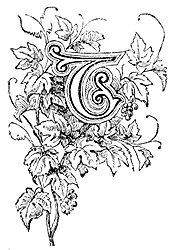 |

HE Hospital of St. Cross, an ancient and picturesque building near this city, was built by King Stephen, and is still a hospital, entire as in the days of the house of Blois. And still the bequest of the great Bishop continues, and every stranger presenting himself at the wicket is entitled to receive bread and beer. The bread is good, the beer what is called small; two gallons of beer and two loaves of bread are distributed daily.
The hospital is built as a quadrangle, enclosing a court; the removal of one side has opened a view of the fields. The buildings are of great antiquity, as we have said. A strong gateway tower gives entrance to the court, and on its outer front kneels a statue of Cardinal Beaufort, in his hat and robes. Milner says: "In the corner over the gateway of this tower we behold the cardinal's hat displayed, together with the busts of his father, John of Gaunt, and of his royal nephews, Henry IV. and V., and of his predecessor, Wykeham. In the spandrils on each side appear the founder's arms, - France and England quarterly. The centre boss in the groining of the gateway is carved into a curious cross, composed of leaves and surrounded with a crown of thorns."
On the left is a cloister, in the centre of which is a projecting recess, in which stands an old table, said to have been used by Charles II. The cloister terminates in the church, and over it are the nuns' rooms, formerly occupied by three hospital sisters who attended the sick. Here also are the wards where the sick brethren were nursed. On the east end of these rooms is a window opening into the church, so that the invalids might hear mass as they lay in their beds. On the opposite side of the court are the brethren's houses. They have three small chambers each and a garden. They must be unmarried, or, if married, must not bring their wife here; they must wear a black gown with a silver cross on the breast. The third line of the building consists of the brethren's hall and the master's residence.
But the church is the glory of St. Cross. The whole of the building has the air of great antiquity. With the exception of the front and upper storey of the west end, the church was built by Henry de Blois in the reign of Stephen.
"Here," says Milner, "we find the ponderous Saxon pillar, of equal dimensions in its circumference and in its length, which, however, supports an incipient pointed arch." In fact, the building seems to have been a mixture of architectural essays, and is both venerable, curious, and picturesque. As a whole, however, it is thoroughly Saxon, with massy round pillars, and round arches with the billet and zigzag mouldings mixed with a variety of ornaments.
With this brief notice of St. Cross we take our leave of the old capital of England and its neighbourhood.
We have not space to describe Wykeham's College, but there is a very sad and touching story attached to St. Mary's College, which we must relate.
About two hundred and fifty years ago a scholar of this college was - for some offense committed - confined by order of the master; report says he was chained to a pillar. It was close on Whitsuntide, and he saw his companions depart joyously to their homes, leaving him an unhappy prisoner. His only consolation was to compose in Latin the well-known "Dulce Domum," in passionate regret and memory of the happiness of former years. Grief at his disgrace and disappointment affected him so deeply, that when his companions returned he was dead. Annually, in commemoration of this sad event, on the evening preceding the Whitsun holidays, the master, the scholars, and choristers of the College walked in procession round the court of the College and the pillar to which the unfortunate youth was tied, and chanted in Latin, accompanied by a band of music, the verses he composed in his affliction.
The following is a translation of
|
 |